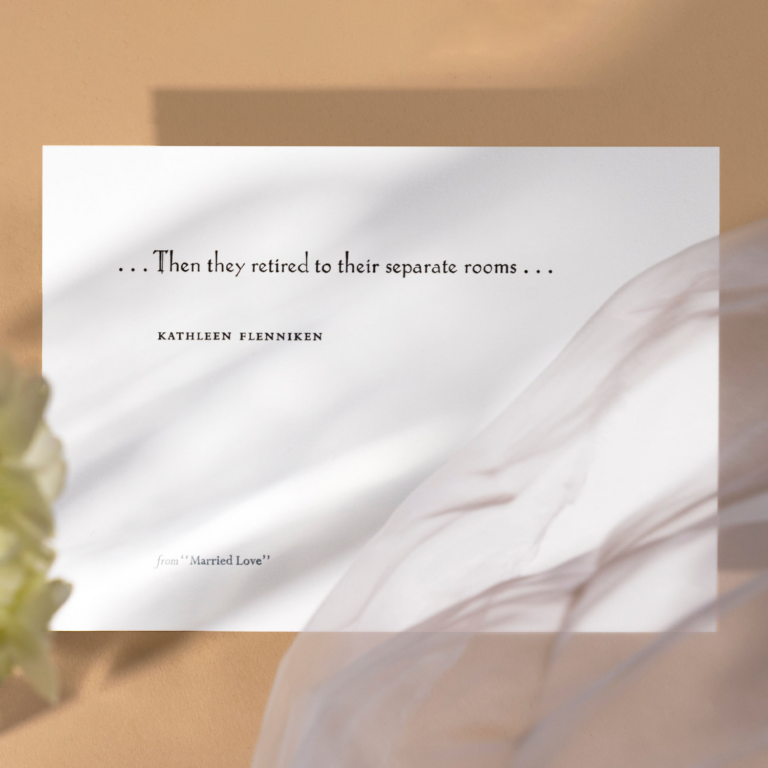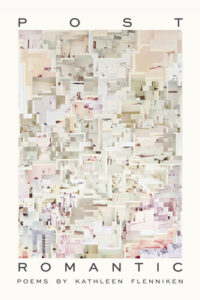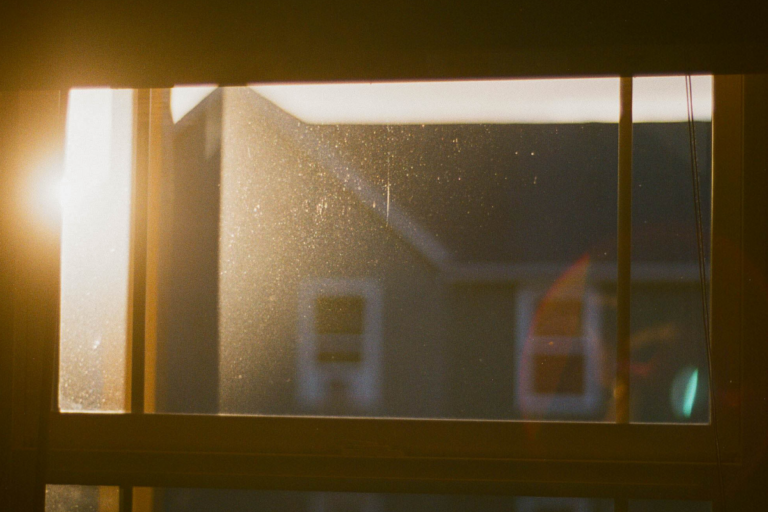Kathleen Flenniken
Married Love
In a poem of extraordinary poise, Kathleen Flenniken recounts her parents’ lively parties, their rich social life, their summer trips, and their friendships: friendships that were not always straightforward. The poem closes with an observation of a moment of sexual tension between her mother and another man. Kathleen’s right there, but feels like she’s barely noticed. Everyone goes to bed alone, and we are left with the poet and her awareness of what lay underneath the surface.

Letterpress prints by Myrna Keliher | Photography by Lucero Torres
Guest

Kathleen Flenniken is the author of three poetry collections, most recently Post Romantic, selected by Linda Bierds for the Pacific Northwest Poetry Series and published by University of Washington Press in Fall 2020. Kathleen’s awards include a Pushcart Prize and fellowships from the National Endowment for the Arts and Artist Trust. She served as Washington State Poet Laureate from 2012 – 2014.
Transcript
Pádraig Ó Tuama: My name is Pádraig Ó Tuama, and one of the things I love about poetry is that it can speak to you at different ages of your life. There’s poems I’ve loved since I was a child that I might’ve read at the age of 8 and 18 and 38 and 45. And then there’s poems, too, that I know the poet wrote this just when they were 30, and when I would’ve been 30, I’d have read the poem and felt a kind of connection with it, but then, even when I got older, I continued to read the poem and feel a connection there. Poems can change with me as I grow older. And there’s a kindness, I think, in the way poems too can offer some kind of parenting and some kind of support to you, as you’re trying to look out to the world and observe what you can observe.
[music: “Praise the Rain” by Gautam Srikishan]
“Married Love” by Kathleen Flenniken:
“All of them are dead now. My father
and mother, bedded together
under their matching stones.
Their married friends, close by.
The crystal and good plates all washed
and put away in other homes,
no party food left over. My job
was to whip the cream for dessert
and ride behind on their fishing weekends
like a seventh wheel,
along with our Airedale who wore
striped socks over his muddy paws
in the house. Spirits accelerated
toward cocktail hour in the red
ranch kitchen where they made
big to-do’s over their drinks—
then feigned concern they might
corrupt me. The men stirred
the air, clustered at the bar, moved
among the women conferring
over the bubbling stew.
My mother, flushed and pretty
as a cornucopia of summer fruit.
That September before college
I joined the happy group
on a fly-fishing river in Montana
and slept on the cottage’s foldout couch.
Late one evening, lights doused,
I was alone with Mother and one
of the men, not quite uncle
not quite friend though I newly
recognized that he was handsome.
I’ve erased whatever he said
that convinced me he’d forgotten
I was there. But there I was, afraid
to breathe, confused to learn
how delicately balanced
these practitioners of marriage must be.
Then they retired to their separate rooms,
though a presence hung in the air
like perfume.”
[music: “Memoriam” by Gautam Srikishan]
I heard Kathleen Flenniken recite poetry at a festival in Madrid a few years ago, and it was a festival of about 60 or 65 people crammed into a tiny bookshop. And in the middle of all the heat and noise and excitement of this she managed, in the quietness and the poise of her poetry, to open up small moments of recognition. And so I was really keen to see where else she’d done this in poetry, because it is a feature of hers that she can look at a moment and go into it, and in a strange way, you feel like there is so much space.
In this poem here, “Married Love,” there is so much attention given to observing the space between her and her parents, between her and her parents’ friends, almost between her and her life, and then right at the end, between her and her mother and this other man. There’s so much space for her to reflect and to wonder. Nothing happens too quickly, although you never feel like anything’s dragging on, either.
And I wanted to explore this poem, because it pays such close attention to what’s being observed around you. It’s a poem that is fairly devoid of any judgment. It just watches. It just sees. And it has some loneliness and some change and some growing-up happening within it, and some lessons and some teaching, but it doesn’t judge. It just shows. And that, I think, is an extraordinary piece of art, as well as a really human piece of understanding.
[music: “First Grief, First Air” by Gautam Srikishan]
This poem begins with a fairly bald statement about her dead parents, and not only her parents, but her parents’ friends. And she speaks about them all being buried in the earth, and their goods are in other homes, for other parties. And so the poem starts off sounding like it’s going to be an elegy to her parents and their married love and that they’re dead now. But the music that she creates opens up something much more. And you get the impression that she observed her parents’ well-friended life, that her parents were the kinds of parents who had friends and parties and weekends away, and that she came along and, as time went by, was initiated more and more into adult company.
Everybody sounds very nice to her here, but she also is not the center of attention. I don’t in any way get an impression that she’s accusing her parents that they didn’t love her, but she is revealing a kind of a parenting style where she is loved, present, included, but not worshipped as the most important person in the room. [laughs] It’s the kind of style of family that I’m used to, too, so I recognize part of my own life in that.
In the middle of all this, there’s a loneliness, too, in the sense of not being the center of attention. You know, she talks about going on “their” fishing weekends, rather than “our” fishing weekends, that bit of a distance that’s there. Calling yourself the “seventh wheel” — is that because there’s three adult couples, her parents and two others, and that somehow she is their extra, alongside the dog who has to wear special socks so that it doesn’t get mud on the floor? Is she, too, somebody who they want there, but they don’t want her, either, taking up too much attention? And so the floors in the house are kept clear of the evidence of the dog, and [laughs] I wonder, was there a small moment of wondering, are the floors of the house meant to be kept clear of the evidence of daughter, as well — present but not eminent in the memories of her parents’ parties?
[music: “Toothless Slope” by Blue Dot Sessions]
There’s so much that happens in that final turn of the poem. So, late one night, you know, she’s waiting for the room to clear of adults so she can make her bed on the couch. Again, here’s another style — that she isn’t given a room, you know; she’s on the foldout couch, and then the adult couples clearly have rooms. And she senses attraction between her mother and another man, and she, too, has recently come to realize that this man is attractive. He’s “not quite uncle,” he’s “not quite friend.” And in this, perhaps, she is beginning to recognize the reality of sex lives of adults. Perhaps lots of us can recall how awkward it can be to think about your own parents’ sex lives.
But here she is, thinking about her mother’s sex life independent of her marriage, and recognizing perhaps some kind of electricity of energy that’s happening. The man who’s there has said something, and she can’t quite recall what it is, to imply that he’s forgotten that she’s there. Perhaps he’s chosen to forget that she’s present. He’s trying to communicate something. And she is learning what it means to be in married love. This man and her mother go off to their separate rooms.
But I partly wonder about the mother character in this poem. Is she glad that this is happening, because it’s a certain kind of parenting and an introduction into an adult world, to say, “Yeah, this kind of thing will happen; it’s OK. Go off to your own room with your partner”? Is this a certain form of parenting, not just of a child, but parenting of an adult who is just about to go off to college? Is she showing her something here? Is this an extraordinary connection between these two women of the poem?
Again, because there is so little of demonstrative love being narrated in this poem — nobody’s saying to the teenaged daughter, “We’re proud of you. We love you. Whatever you do is great. Everything is sorted around you. Whatever you want” — none of that’s there. She’s kind of there to be there, but not get in the way. But there is this fascinating care and love that is being shown to her about the ways within which her mother is showing her something about what it means to be an adult and what it means to be a married adult. And in that context, she is being shown profound love.
[music: “First Grief, First Air” by Gautam Srikishan]
The poem is 41 lines long, and it’s in loads of couplets, 20 couplets. And then there’s that final line, “like perfume.” And it’s a line just by itself, almost like a stanza, a two-word stanza just by itself: “like perfume.” Perfume is easy to sense but impossible to grasp, and perhaps, too, that’s what she’s trying to describe — that it is so sensual to refer to what you can smell, but that’s not visual. You know, you can’t hear it. You can’t put boxed reality around it. Somehow, there’s an air that’s being implied here.
There’s something about that in this poem that I really like. I like the recognition of it. I like the acknowledgment of the loneliness of adolescence. And I like, too, the ways within which she is being shown things, subtly. Her poem is a subtle poem. It’s got these tiny little moments of seeing. And too, the poem in its art is a subtle poem because it’s got these tiny little moments of showing. I don’t think it’s so crude as to say that her mother is kind of flaunting the fact that she’s saying, “Well, I could have an affair with this man if I wanted.” I don’t think it’s that. I think it’s that her mother is comfortable with attraction and sexuality amongst couples who hang out with each other a lot. And she is not freaked out by that.
You know, I think it’s entirely possible that some people will hear this poem and say, “I hate it,” because you might think this is a poem about an affair or almost an affair, or a poem about not being loved enough as a child, or a poem about my parents never having had time for me, or about feeling lonely or feeling like you don’t fit in or feeling like you’re not wanted. And what I think is really important is to recognize that if you have a strong reaction to this poem, it’s to recognize that that’s the effect of the poem happening in you, because the poem itself is almost completely without judgment. It’s just laying these things out in front of us. And I think it’s really important not to judge the poem based on your reaction.
The poem is asking you to pay attention to your reaction. There’s an effect that’s happening here. And as a result, the poem’s work happens really in how it’s received: to think, “Oh, I really struggled with that,” or, “It brought something up for me.” That’s the work of the poem — again, quiet, not being overly dramatic, not shouting but just saying, Pay attention to that. Pay attention to that.
I do find Kathleen Flenniken’s work so consistently brave and quiet and strong, all together, just gently going through and opening something up and saying, “I see this. What do you see when you see this?” and inviting the reader or the listener to the poem into their own examination of their own response.
[music: “Memoriam” by Gautam Srikishan]
“Married Love” by Kathleen Flenniken:
“All of them are dead now. My father
and mother, bedded together
under their matching stones.
Their married friends, close by.
The crystal and good plates all washed
and put away in other homes,
no party food left over. My job
was to whip the cream for dessert
and ride behind on their fishing weekends
like a seventh wheel,
along with our Airedale who wore
striped socks over his muddy paws
in the house. Spirits accelerated
toward cocktail hour in the red
ranch kitchen where they made
big to-do’s over their drinks—
then feigned concern they might
corrupt me. The men stirred
the air, clustered at the bar, moved
among the women conferring
over the bubbling stew.
My mother, flushed and pretty
as a cornucopia of summer fruit.
That September before college
I joined the happy group
on a fly-fishing river in Montana
and slept on the cottage’s foldout couch.
Late one evening, lights doused,
I was alone with Mother and one
of the men, not quite uncle
not quite friend though I newly
recognized that he was handsome.
I’ve erased whatever he said
that convinced me he’d forgotten
I was there. But there I was, afraid
to breathe, confused to learn
how delicately balanced
these practitioners of marriage must be.
Then they retired to their separate rooms,
though a presence hung in the air
like perfume.”
[music: “Praise the Rain” by Gautam Srikishan]
Chris Heagle: “Married Love” comes from Kathleen Flenniken’s book Post Romantic. Thank you to the University of Washington Press, who gave us permission to use Kathleen’s poem. Read it on our website, at onbeing.org.
[music: “Praise the Rain” by Gautam Srikishan]
Poetry Unbound is: Gautam Srikishan, Erin Colasacco, Eddie Gonzalez, Lilian Vo, and me, Chris Heagle.
Our music is composed and provided by Gautam Srikishan and Blue Dot Sessions.
This podcast is produced by On Being Studios, which is located on Dakota land. We also produce other podcasts you might enjoy, like On Being with Krista Tippett, Becoming Wise, and This Movie Changed Me. Find those wherever you like to listen, or visit us at onbeing.org to find out more.
Books & Music
Recommended Reading
The On Being Project is an affiliate partner of Bookshop.org and Amazon.com. Any earnings we receive through these affiliate partnerships go into directly supporting The On Being Project.







